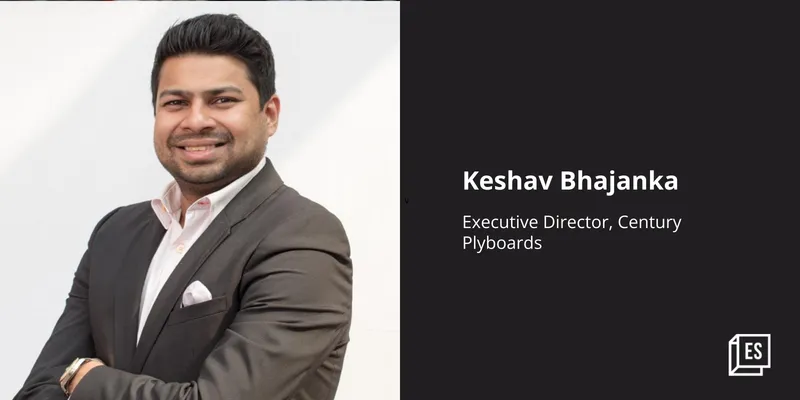Century Plyboards bolsters manufacturing, tech to capitalise on strong anticipated demand
Century Plyboards has expanded its manufacturing facilities across the country as it expects demand for plywood and decorative wood products to remain strong.
The second generation of management at , the Kolkata headquartered plywood and decorative wood brand, is keen to take the legacy forward via investments in technology and manufacturing.
Founded in 1986 by Sajjan Bhajanka and Sanjay Agarwal, Century Plyboards has emerged as one of the leading players in the decorative wood market in India. Its products span plywood, laminates, veneer, medium density fiberboards (MDF) and particle boards.
Keshav Bhajanka, Executive Director of Century Plyboards and son of Sajjan Bhajanka, says the company’s success lies in its focus on customer experience.
“We work on the principle of under-commit and over-deliver. This has resulted in high customer loyalty,” says Bhajanka.
The plywood and decorative wood market in India comprises both organised and unorganised players, with latter accounting for at least half the market share. According to IMARC Group, the Indian plywood market size touched Rs 20,800 crore in FY23 and is expected to reach Rs 30,600 crore by FY29. If one adds the other segments like laminates and veneer the total market size is around Rs 25,000 crore annually, according to industry estimates.

Given this demand, Century Plyboards is preparing to win a larger share of the market through the establishment of newer manufacturing facilities spread across the country. A majority of its current manufacturing capacity is largely in West Bengal. However, the company is now expanding into Tamil Nadu, Uttar Pradesh, Punjab and Andhra Pradesh.
These manufacturing facilities, under various stages of commissioning, are focused on different product segments. Bhajanka says the investments by Century Plyboards into these units are being done through internal accruals. He says that the quality of the company’s products has given it the pricing power to generate the necessary capital internally.
“We take a long time before making any decision and are very pragmatic in getting clear returns,” he remarked.
In addition, he also says how the company has lined up Rs 1,700 crore for future capital expenditure. Prior to this, Century Plyboards had overall spent around Rs 900 crore in capex-related activity.
Century Plyboards registered a revenue of Rs 3,027 crore for FY22 with a net profit of Rs 313.15 crore. In comparison, it had posted a revenue of Rs 2,130 crore in FY21 with a net profit of Rs 191.2 crore.
Despite the expected rise in demand for plywood, there are some larger ecosystem hurdles. The Reserve Bank of India (RBI) recently raised interest rates to tame inflation, which has led to costlier home loans and lower sales.
The Indian housing market, however, has shown resilience in the first three months of 2023. According to real estate consultancy firm Anarock, quarterly housing sales are at an all-time high in the last decade with approximately 1,13,770 units sold in the first quarter of 2023 across top seven cities. This is a 14% yearly rise against approximately 99,550 units sold in the comparable one year ago period. The National Capital Region, Mumbai, Bengaluru, Pune and Hyderabad accounted for 89% sales in the quarter.
Bhajanka remains confident about the long term growth prospects in the residential and commercial real estate market of India. “The potential is tremendous and takeoff is yet to happen. We will grow in all our business segments,” he remarks.
To tap into the growing demand, Century Plyboards is also leveraging technology to deliver higher value to its customers as well as drive efficiency within the organisation. For example, it has launched “Promise App”, which allows the customers to identify the genuineness of plywood or other related products. It has also deployed automation and supply chain technologies for its sales force to get a better overview of its linkages with the buyers of its products.
Bhajanka says that the company has noticed a 40% increase in the productivity of its sales force once they were all onboarded onto a technology platform.
The Executive Director of Century Plyboards says plywood is an eco-friendly product as these are sourced from agroforestry.
Bhajanka believes other broader changes in the ecosystem—rapid urbanisation, higher demand for housing as well as the shift from unorganised to organised players and the rise of innovative products in the segment—will all contribute to the future success of decorative wood products.
“This industry is only going to get stronger,” remarks Bhajanka.
Edited by Affirunisa Kankudti






